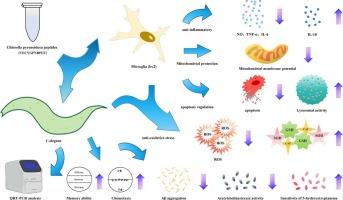蛋白核小球藻肽的神经保护作用
IF 4
2区 农林科学
Q2 FOOD SCIENCE & TECHNOLOGY
引用次数: 0
摘要
神经退行性疾病是以神经元进行性丧失为特征的慢性神经系统疾病,严重影响患者的认知、记忆和运动功能。然而,现有的治疗方法难以逆转病程。本研究利用BV2细胞和秀丽隐杆线虫模型,通过化学试剂诱导神经元损伤,探讨小球藻pyrenoidosa peptide (CPP)的神经保护作用。CPP可降低细胞和线虫体内的ROS水平,提高GSH、SOD和CAT活性,降低细胞内NO、TNF-α、IL-6含量。提高细胞线粒体膜电位,减少细胞凋亡,增强细胞溶酶体活性。此外,CPP通过增强记忆和趋化性,降低AchE水平和对5-HT的敏感性,减少Aβ沉积,减轻神经毒性。CPP上调了ced-9、sir-2.1和daf-16等基因的表达,同时下调了ced-4、ced-3的表达,表明它们的神经保护作用可能涉及调节免疫相关基因、应激抗性基因和抗凋亡基因。本文章由计算机程序翻译,如有差异,请以英文原文为准。

Neuroprotective effects of Chlorella pyrenoidosa peptides
Neurodegenerative diseases are chronic neurological disorders characterized by the progressive loss of neurons, severely affecting patients' cognition, memory, and motor functions. However, existing therapies struggle to reverse the disease course. This study utilized BV2 cells and Caenorhabditis elegans models to induce neuronal damage through chemical agents, exploring the neuroprotective effects of Chlorella pyrenoidosa peptides (CPP). CPP reduced ROS levels, increased the activity of GSH,SOD and CAT in cells and nematodes, as well as reduced NO, TNF-α, IL-6 content in cells. Additionally, it elevated the mitochondrial membrane potential of cells and reduced cell apoptosis, and enhanced cellular lysosomal activity. Furthermore, CPP reduced Aβ deposition and mitigated the neurotoxicity induced by enhancing memory and chemotaxis, decreasing AchE levels and sensitivity to 5-HT. CPP upregulated the expression of genes such as ced-9, sir-2.1, and daf-16 while downregulating ced-4, ced-3 expressions, suggesting that their neuroprotection might involve regulating immune-related, stress-resistant, and anti-apoptotic genes.
求助全文
通过发布文献求助,成功后即可免费获取论文全文。
去求助
来源期刊

Journal of Functional Foods
FOOD SCIENCE & TECHNOLOGY-
CiteScore
9.60
自引率
1.80%
发文量
428
审稿时长
76 days
期刊介绍:
Journal of Functional Foods continues with the same aims and scope, editorial team, submission system and rigorous peer review. We give authors the possibility to publish their top-quality papers in a well-established leading journal in the food and nutrition fields. The Journal will keep its rigorous criteria to screen high impact research addressing relevant scientific topics and performed by sound methodologies.
The Journal of Functional Foods aims to bring together the results of fundamental and applied research into healthy foods and biologically active food ingredients.
The Journal is centered in the specific area at the boundaries among food technology, nutrition and health welcoming papers having a good interdisciplinary approach. The Journal will cover the fields of plant bioactives; dietary fibre, probiotics; functional lipids; bioactive peptides; vitamins, minerals and botanicals and other dietary supplements. Nutritional and technological aspects related to the development of functional foods and beverages are of core interest to the journal. Experimental works dealing with food digestion, bioavailability of food bioactives and on the mechanisms by which foods and their components are able to modulate physiological parameters connected with disease prevention are of particular interest as well as those dealing with personalized nutrition and nutritional needs in pathological subjects.
 求助内容:
求助内容: 应助结果提醒方式:
应助结果提醒方式:


